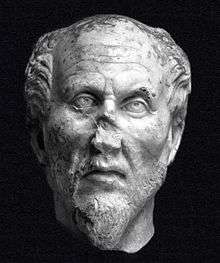Roman philosophy
Roman philosophy was the philosophical thought in ancient Rome, from the Republic of Rome to the Roman Empire.
Characteristics
Romans were better at law than at philosophy. They were the creators of the majority of law institutions. Their philosophy was greatly influenced by the Greek philosophy.
Initially Roman philosophy was based on the epicureism (like in the De rerum natura of Lucretius) and the eclecticism of Cicero, but even on stoicism (like in Seneca' works). Later -with the spread of Christianity inside the Roman empire- the Christian philosophy of saint'Augustine was fundamental.
The Meditations of Roman emperor Marcus Aurelius are still revered as a literary monument to a philosophy of service and duty, describing how to find and preserve equanimity in the midst of conflict by following nature as a source of guidance and inspiration.
Roman Stoicism was the philosophy of: Seneca · Cornutus · Musonius Rufus · Euphrates · Cleomedes · Epictetus · Hierocles · Sextus · Junius Rusticus · Marcus Aurelius
Roman epicureism was the philosophy of: Amafinius · Rabirius · Titus Albucius · Phaedrus · Philodemus · Lucretius · Patro · Catius ·Siro · Diogenes of Oenoanda
Early Roman and Christian philosophy
See also: Christian philosophy
Main Philosophers during Roman times

- Cicero (106 – 43 BCE)
- Lucretius (94 – 55 BCE)
- Seneca (4 BCE – 65 CE)
- Musonius Rufus (30 – 100 CE)
- Plutarch (45 – 120 CE)
- Epictetus (55 – 135 CE)
- Marcus Aurelius (121 – 180 CE)
- Clement of Alexandria (150 – 215 CE)
- Alcinous (philosopher) (2nd century CE)
- Sextus Empiricus (3rd century CE)
- Alexander of Aphrodisias (3rd century CE)
- Ammonius Saccas (3rd century CE)
- Plotinus (205 – 270 CE)
- Porphyry (232 – 304 CE)
- Iamblichus (242 – 327 CE)
- Themistius (317 – 388 CE)
- Augustine of Hippo (354 – 430 CE)
- Proclus (411 – 485 CE)
- Damascius (462 – 540 CE)
- Boethius (472 – 524 CE)
- Simplicius of Cilicia (490 – 560 CE)
- John Philoponus (490 – 570 CE)
Notes
- ↑ The main Sextians were: Sotion, a doxographer and biographer; Papirius Fabianus, a rhetorician and philosopher; Crassicius Pasicles, a grammarian, and Celsius Cornelius, a famous doctor
Bibliography
- I. Lana, La Scuola dei Sestii, Roma 1992
- A.Levi, Storia della filosofia romana, Firenze 1949